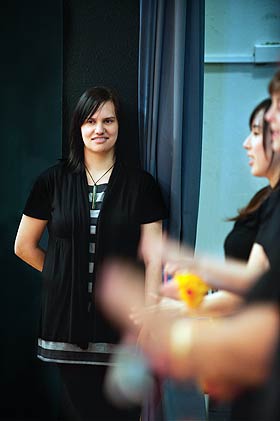

Karyn Paringatai
“There is no single 'Māori perspective'.”
Growing up in Invercargill was not a textbook example of a Māori childhood for Karyn Paringatai (Te Tumu – School of Māori, Pacific and Indigenous Studies).
She looked Māori, her name was Māori. She enjoyed poi and kapa haka. Her father was Ngāti Porou. But, equally, Paringatai was close to her extended Pākehā family and proud of her Polish and Prussian heritage. She didn't speak te reo and rarely visited marae. Her friends were Pākehā and “Māori who were not too hard out”.
So, what kind of Māori was she?
“There's a whole literature that describes Māori identity around factors like speaking the language, knowing waiata, having a connection with ancestral lands. But what if you don't fit that formula?” asks Paringatai. “Does that mean you don't have authentic experiences of being Māori? That seems crazy to me.”
Now, Paringatai's PhD is exploring the stories of those internally migrated Māori – like her father – who left their iwi communities, often in pursuit of employment and opportunities. It also explores the stories of their children, first-generation-born Māori Southlanders, who grew up distanced from their wider whānau and developed their own take on their indigenous identities.
The study centres on Paringatai's father, who left the East Cape as an 18-year-old, encouraged south as part of a recruitment drive for Southland's freezing works. The labourers were offered cheap fares, hostel accommodation and good pay. “I think he saw it as a bit of an adventure.”
He stayed in Invercargill, raised a family, forged friendships and became a part of the community. “We visited my grandparents on the East Cape a few times and I loved it. But with five kids in the car, it wasn't a journey we could take very often.” And, after her grandparents passed away, “Dad never seemed very interested in going back”.
In his early years down south, Mr Paringatai participated in performing arts groups and, years later, supported his daughters to do the same. While it fostered a sense of community for her father, for Paringatai “it was a way of learning about and developing my idea of a Māori identity”.
But if there's one thing she is increasingly convinced of, it's that the very notion of “Māori identity” is far from uniform. When she hears commentators claiming to speak from a Māori perspective, she shudders. “It's just annoying. There is no single 'Māori perspective'.”
It's important too, she believes, that Māori voices and history reflect the wide range of experiences of urban and rural Māori, those with and without strong connections to their iwi and hapā, and not just members of a well-connected and privileged elite.
“These are blue-collar families,” she says of her father's friends and other Southland Māori she has interviewed. “It's been lovely hearing their stories and convincing them that their stories are interesting and important.”
So Paringatai's academic journey has been a personal one, focusing on her immediate family and childhood. And, for her, the endeavour to preserve these stories of Māori internal migration for posterity came just in time and has left her with a very great treasure among her transcripts. A few months after she interviewed him for her study, her father passed away.
Now she hopes that being involved in the study might inspire some families to explore their Māori ancestry and to make connections with lost relatives and tribal areas. But Paringatai respects that, among her interview subjects, the idea carries varying amounts of trepidation and “there are some who are not interested in this at all”.
However, by telling the stories of those people with feet in both Māori and Pākehā worlds, Paringatai's study makes the simple point that, for plenty of New Zealanders, being both Māori and Pākehā is pretty normal. It's a message of integration, not division.
Indeed, Paringatai says she is pleased to do her bit to help crosscultural understandings: “I have to admit that when I am with Māori, I defend Pākehā, and when I'm with Pākehā, I defend Māori!”